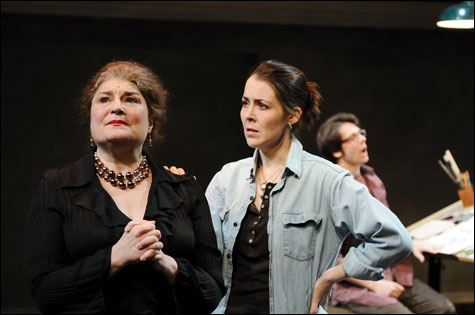
DEALING WITH IT, Scurria and Warren. |
David Hare's The Secret Rapture, which Trinity Repertory Company is presenting through March 29, is one of those tricky little plays — straightforward on the page, but able to wander off in various directions on the stage. This is the sort of theater that directors were invented for."It's a family play," Trinity Rep artistic director Curt Columbus says. "And I was thinking of our little crazy acting company family. Twenty years ago I saw a really incredible production of this play in Chicago, and it really stuck with me. But it wasn't forebrain at all, it was somewhere in the haunted background."
In this way, a complicated 20-year-old mid-career play by the prolific British playwright, little produced in this country, came to join the Providence season. Set in the England of Margaret Thatcher, it examines moral complexity and the culpability of two sisters on opposite ends of the compassion spectrum.
"Here's the thing that leapt out at me: it reminded me of Chekhov more than anything I had read in a long time," Columbus continues. "Because Hare, like Pinter, writes in these sort of open-ended spaces. Incomplete sentences, half-finished thoughts. Unlike Pinter, they are all very rooted in a kind of reality. Pinter's off in some dream world, Hare's really talking about real things."
The director had a second reason, as well. "Like Chekhov, there is a very palpable, political subtext to the whole affair. The way that Chekhov describes a certain human moment in time but with political lives, but it never gets stuck or" — he pauses to find the word — "periodical, if you will. But instead it gets released into consideration of: Where are we now? That's what's great about David Hare too."
The political subtext is that of Prime Minister Margaret Thatcher's England of the 1980s, a period of conservative ascendancy that had its parallel here with Ronald Reagan, the commonality being poor folk be damned. We have businesswoman Marion (Phyllis Kay), the Darwinian Thatcher stand-in, and Isobel (Rachael Warren), an epitome of selflessness who, after their father dies have to deal with each other — and with his difficult widow, Katherine (Anne Scurria).
Columbus says he was looking for "a real actor's play." Other company members so challenged are Fred Sullivan Jr. and Stephen Thorne, plus Brown/Trinity Consortium student Patricia Lynn.
Big, bulky baggage that the play brings with it is a major brouhaha over its 1989 Broadway opening. New York Times critic Frank Rich, who had loved the London production, brutalized David Hare's direction of the play on this side of the Atlantic. Referring to the performance by Blair Brown, Hare's former girlfriend, as Isobel, Rich wrote: "It is clear that another director will have to help the actress realize the dream performances that remain locked in the playwright's imagination." The review went downhill from there.
"We've heard that Mr. Hare's direction of it never rose to the level of the direction of Howard Davies in London," Columbus says, "that he was a little too in love with the political text of the play, that he was pretty focused on that. Again, like Chekhov, if you focus on that" — and he laughs lightly — "you're fucked. I mean, there's no purchase there. There's information there, but there's nothing dramatic there."